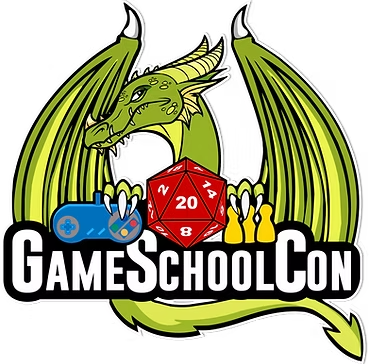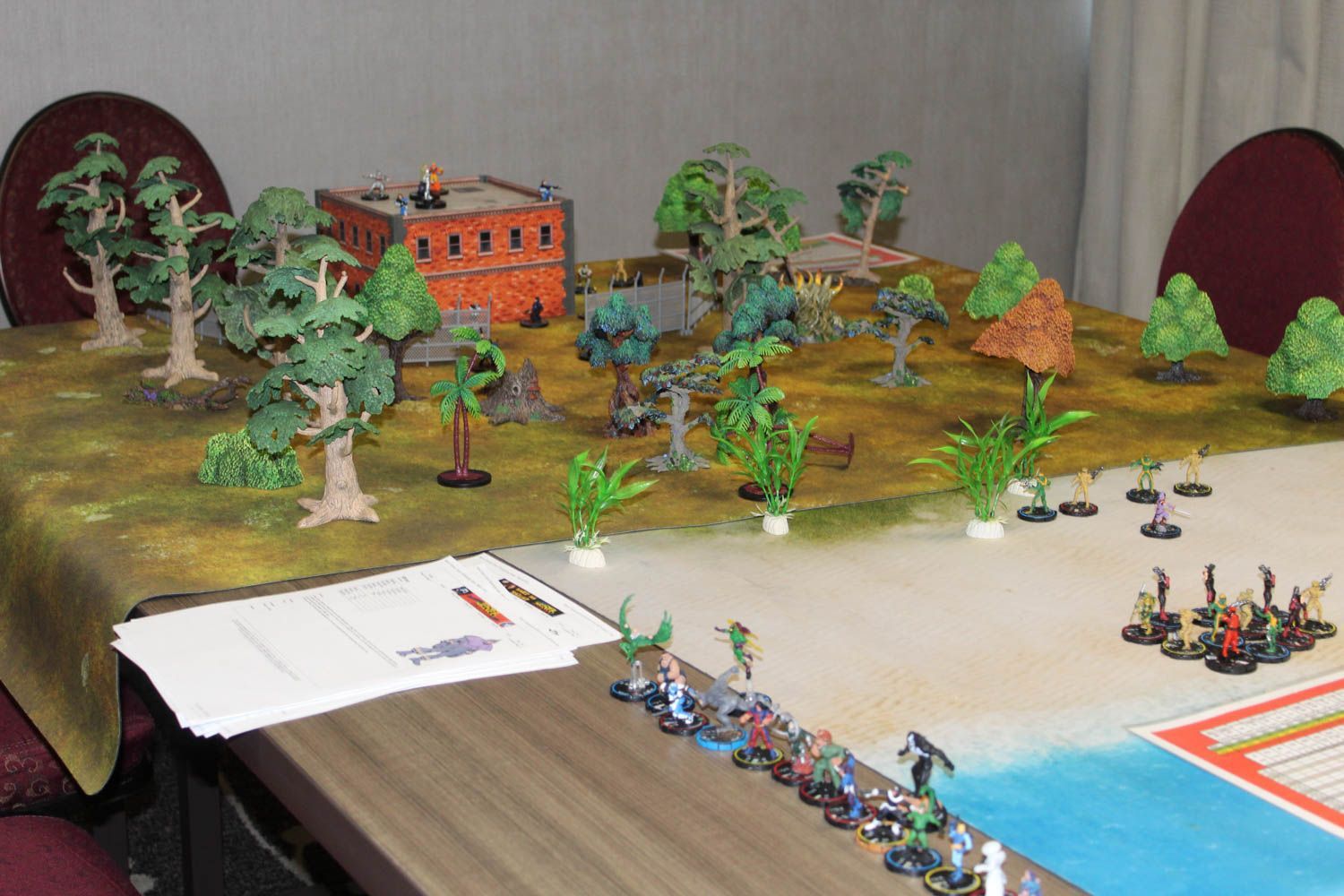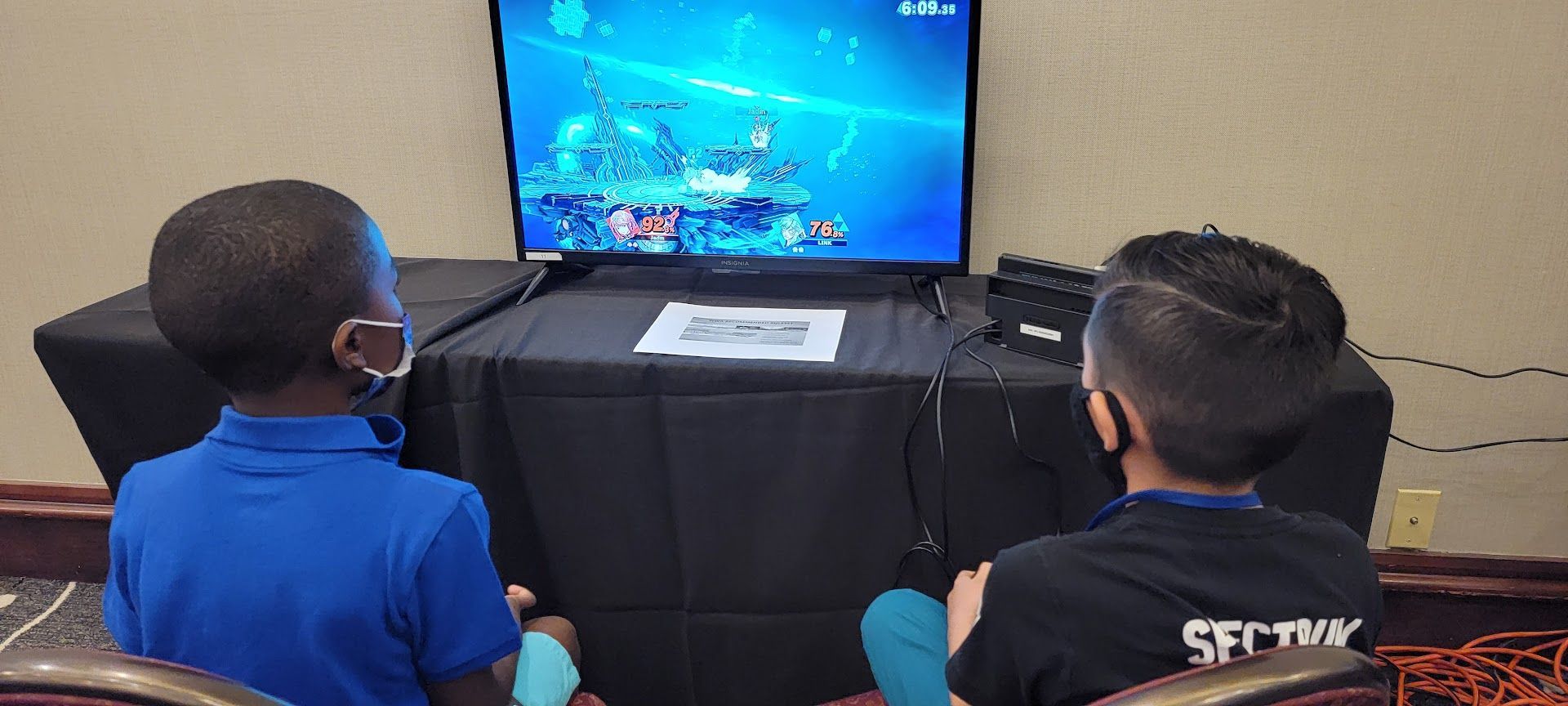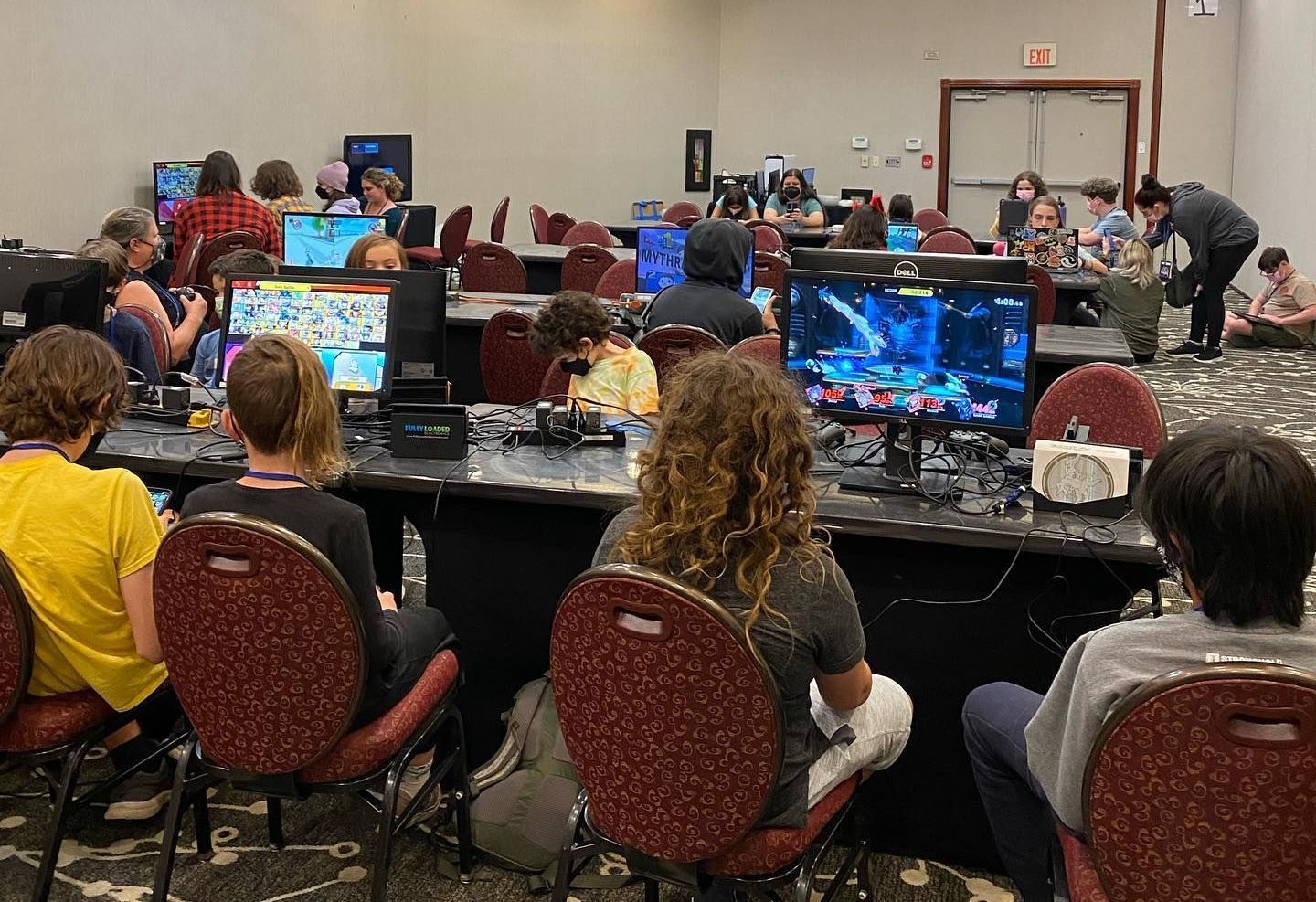February 19-22, 2026
GameSchoolCon
What is Gameschooling?
Gameschooling: Learning Through Play
Gameschooling is the practice of using games as a tool for learning—and often, for living. Whether it’s board games, card games, tabletop RPGs, or video games, Gameschooling means learning through play and embracing the magic of curiosity, connection, and discovery. It’s part of a broader movement toward game-based learning, a method educators and families use to teach real-world skills through play. Gameschooling takes that idea beyond the classroom and into everyday life.
At its core, Gameschooling is playing to learn.
Studies on play-based education show that play increases memory retention, emotional regulation, and motivation to learn. When learners are relaxed and curious, they’re better able to make lasting connections. Games naturally create those conditions.
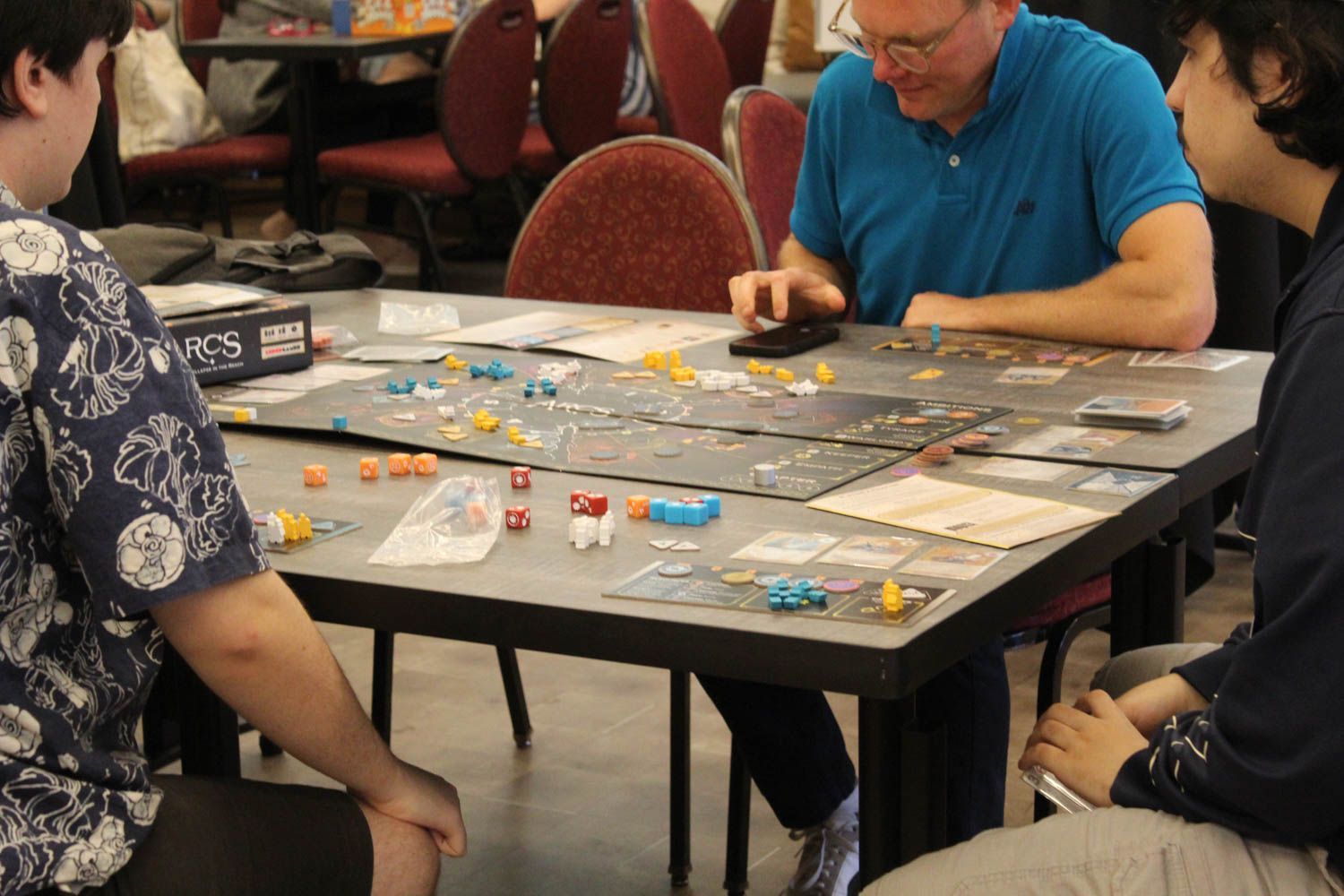
Why Gameschooling Works (The Science Behind Play)
Play is not just a break from learning. It is one of the most effective ways our brains build and retain knowledge. Research shows that play activates the same regions of the brain involved in memory, focus, and emotional regulation. When learners are curious and engaged, their brains release dopamine, which helps information stick.
Games create these conditions naturally. They invite experimentation, strategic thinking, and emotional resilience. Losing a game teaches how to recover from frustration. Trying again builds perseverance. Cooperative play strengthens empathy and communication.
According to Scholastic, board games help children develop reasoning, logic, and problem-solving skills while also improving attention span and emotional control. The Atlantic reports that family game nights boost academic performance and strengthen communication between parents and children. Education World notes that games in the classroom encourage collaboration, motivation, and critical thinking far more effectively than repetitive drills.
When learning feels like play, it sticks. Games build the habits that lead to lifelong curiosity — focus, patience, adaptability, and creative problem-solving.
Why You Should Be Gameschooling (The Heart of It)
Games are fun, and fun matters.
When learning feels joyful, kids stay engaged and remember more. A playful approach turns frustration into curiosity and turns practice into adventure. Gameschooling lets families rediscover that learning can feel good.
It also builds family culture. Gathering for a game creates shared memories and connection that last long after the cards are put away. It gives families a rhythm of togetherness that carries through every stage of childhood.
Games quietly teach social and emotional intelligence. Kids learn to take turns, listen, negotiate, handle disappointment, and celebrate others’ success. Those experiences build empathy, confidence, and cooperation in ways lectures never could.
And if you want games that teach concrete subjects, there are many that do. Some weave math, reading, or geography into their mechanics. Others teach creativity, history, or teamwork through immersive storytelling. The most powerful lessons come from games that make kids think, laugh, and want to play again.
The truth is simple: lessons learned through joy are remembered longest. Gameschooling works because play makes learning
meaningful.
How to Gameschool
There’s no single way to gameschool, and that’s what makes it so effective. Gameschooling adapts to your environment, your learners, and your goals. Whether you’re guiding a classroom, running a youth program, or raising curious kids at home, games can bring learning to life in ways that fit your style.
The foundation is simple: choose games with intention, play often, and reflect together. You don’t need a detailed curriculum or a library full of expensive boxes. What matters is creating opportunities for players to think, collaborate, and grow through shared play.
Bringing Games Into Learning
Games can serve many roles in an educational setting. Some families and educators use them to spark interest in a new topic. Others use games to reinforce concepts or give learners a hands-on way to apply what they know. You can:
- Start or end a lesson with a quick game that connects to the day’s theme
- Focus on one game for a week to explore its mechanics and strategies
- Replace review worksheets with trivia or resource-management games
- Invite older learners to teach games to younger ones
- Host community or classroom game afternoons to build social skills and teamwork
There’s no formula to follow. Gameschooling works because it’s flexible. The rhythm will look different for every group, but the goal is the same: learning that feels natural and engaging.
Setting the Scene
A good gameschooling session isn’t just about what you play — it’s when and how you play. Choose times when learners are alert and ready to engage. Mornings can be great for focus-heavy games, while evenings might suit lighter, familiar favorites. Keep sessions short when trying something new, and gradually build stamina as interest grows.
Gameschooling thrives on connection. Celebrate big wins, laugh at the unexpected, and talk about what happened during play. Reflection turns experience into understanding, whether you’re discussing a tough decision, a moment of cooperation, or a clever strategy.
For more on how play strengthens relationships and builds a positive learning culture, visit our blog Making the Space: How Games Bring People Together.
Keep It Playful
Gameschooling isn’t about squeezing every ounce of education from a game. It’s about recognizing how naturally learning happens when people play together. Stay open, experiment, and remember that fun and learning are not opposites — they’re partners.
At GameSchoolCon, we love helping people find their own rhythm of play and learning. Join us to explore new games, learn practical approaches from experienced educators and creators, and see how games can transform the way you teach, parent, and connect.
Do I Have to Homeschool to Be a Gameschooler?
Not at all!
While Gameschooling is increasingly popular among homeschooling families, anyone can be a Gameschooler. Learning through play is natural and universal—it doesn’t have to be tied to a specific curriculum or educational model.
You might:
- Be a full-time homeschooling Gameschooler
- Incorporate games into your afterschool routine
- Use games in virtual or traditional school settings
- Bring games into community programs or family time
Gameschooling is for anyone who believes that play is powerful.
What Makes a Game Educational?
All games are educational. Yes, even that one.
While some games are designed with direct academic goals in mind, most help players develop essential life skills that go far beyond content knowledge. Games strengthen communication, critical thinking, focus, and emotional awareness through the simple act of play.
Here are just a few examples of what games can teach:
- Verbal communication and storytelling
- Negotiation and turn-taking
- Literacy and numeracy
- Reasoning and logic
- Focus and attention span
- Empathy, fairness, and emotional regulation
Role-playing games like Dungeons & Dragons encourage teamwork, creativity, and strategic thinking while giving every player a voice in collaborative storytelling. Strategy games develop foresight and decision-making, while party and social games strengthen empathy and quick thinking.
Learning does not have to come from textbooks or lectures. It happens naturally when we play. For a closer look at how specific skills develop through gaming, explore some of our favorite examples:
- Six Ways Games Have Been Secretly Teaching Your Kids Math All Along – how everyday games build confidence and fluency with numbers
- 10 Games That Build Literacy Skills (and Are Actually Fun) – reading, storytelling, and language learning through play
- 5 Games That Quietly Teach Kids Real Leadership Skills – how games foster teamwork, confidence, and problem-solving
Games offer real, measurable growth wrapped in fun, which is exactly why they work.
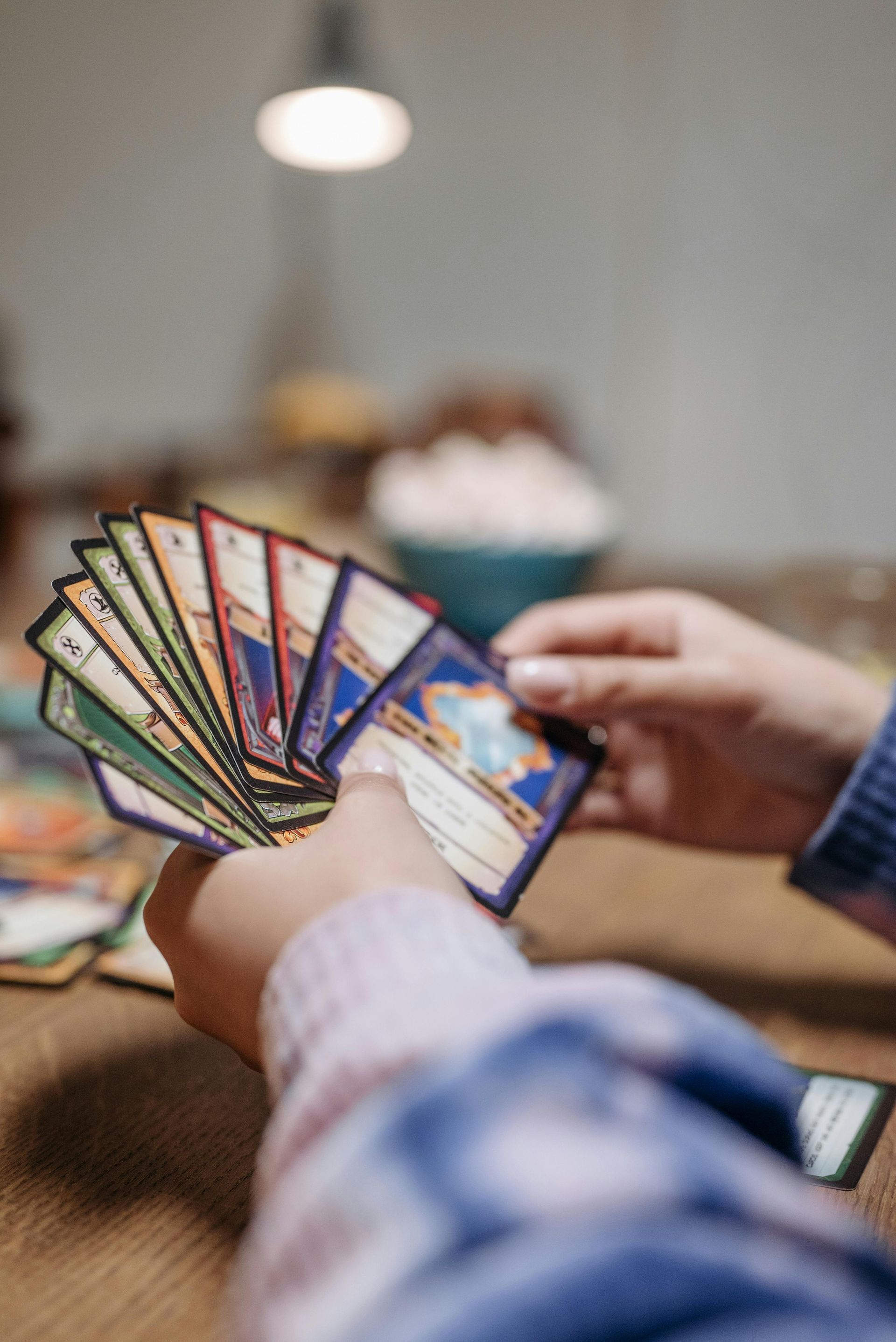
Are Video Games Part of Gameschooling?
Yes! Though screen time is a personal choice for each family, video games have been shown to support cognitive, emotional, and even physical development.
- Video games improve visual processing, memory, and executive function
- Many games promote exercise, coordination, and social connection
- Gameplay is linked to reading gains, motor control, multitasking, and even lucid dreaming
Gaming isn’t just entertainment. It’s a chance to build skills and explore complex, immersive worlds. When chosen with intention, video games can help learners think critically, cooperate, and explore creativity in new ways.
For a deeper look at how digital play can enhance learning, read our blog Why Video Games Deserve a Place in Your Child’s Learning Journey
Gameschooling is for Everyone
Gameschooling isn’t just for homeschoolers—it’s for anyone who values curiosity, creativity, and connection. Whether you're a parent, teacher, librarian, afterschool leader, or just someone who loves a good board game night, Gameschooling can enhance your learning environment.
You might be:
- A full-time homeschooling parent using games as a primary learning tool
- A public or private school educator incorporating games into your lessons
- A caregiver or community organizer looking for screen-free ways to engage kids
- A gamer family who wants to turn game night into something more meaningful
- A neurodivergent learner thriving in a flexible, playful setting
Gameschooling meets learners where they are. It’s adaptable, inclusive, and joyful—and you don’t need a curriculum or classroom to start.
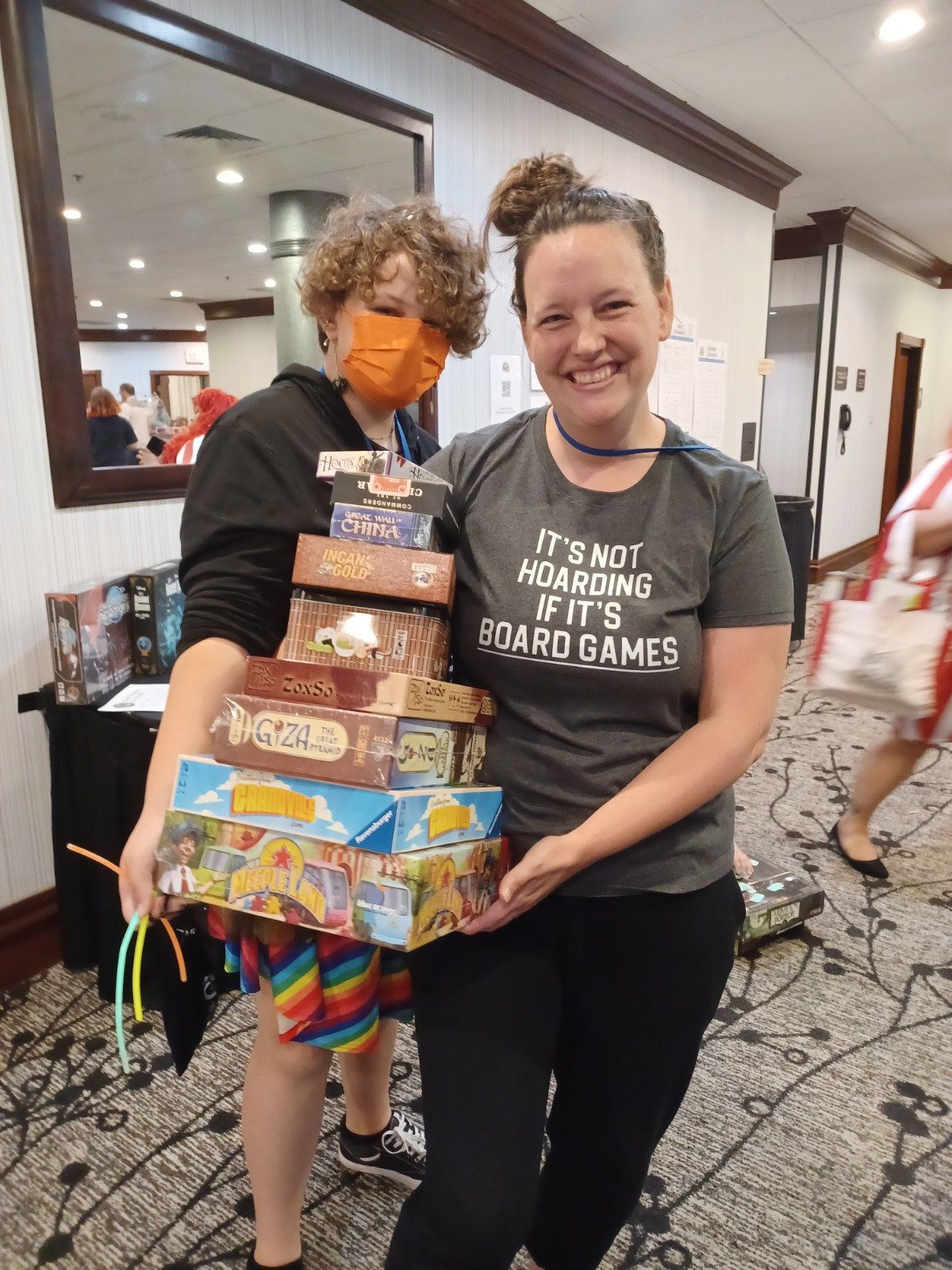
Where Can I Learn More About Gameschooling?
If you’re ready to bring more play into your learning routine, we have resources to help you start.
Our free Beginner’s Guide to Gameschooling breaks down the basics and shares practical ways to introduce games into your day. You’ll find ideas for all ages, tips for choosing the right games, and insights into why play-based learning works so well.
When you’re ready to go deeper, experience gameschooling in action at GameSchoolCon. It’s the only event of its kind — a weekend where families, educators, and creators come together to learn, play, and connect through shared experiences. You can try new games, hear from experts, and meet others who believe in the power of play.
To get a feel for what the weekend is like, visit our blog
Why GameSchoolCon Is the Ultimate Family Learning Adventure.
Frequently Asked Questions About Gameschooling
Do I need to buy a bunch of games to start Gameschooling?
Not at all! Many families begin with what they already have, such as Uno, Monopoly, or Minecraft. You can also borrow games from friends, local libraries, or game cafes. Gameschooling is about how you use the games, not how many you own.
Is Gameschooling just playing games all day?
Gameschooling is intentional learning through play. The focus is on using games to encourage problem-solving, communication, and creativity. It’s learning that feels natural, not forced.
What ages is Gameschooling best for?
Gameschooling works for every age group. Young children learn patience and cooperation. Tweens and teens explore strategy, storytelling, and leadership. Even adults gain critical thinking and social skills from shared play.
Can Gameschooling cover subjects like math or writing?
Yes. Many games naturally include math, reading, and storytelling. Role-playing games build literacy and creative writing, while games like Prime Climb and Yahtzee strengthen math fluency. Explore more in Six Ways Games Have Been Secretly Teaching Your Kids Math All Along and 10 Games That Build Literacy Skills (and Are Actually Fun).
Can gameschooling work in classrooms or group settings?
Yes. Teachers, librarians, and afterschool leaders use games to build teamwork and engagement. Read Making the Space: How Games Bring People Together for practical ideas on building community through play.
Where can I find ideas for gameschooling?
Start with our free Beginner’s Guide to Gameschooling, which includes tips and game ideas for every age group. You can also explore the GameSchoolCon Blog for articles, recommendations, and inspiration.
How do I explain Gameschooling to skeptics?
Focus on the skills being developed—like communication, problem-solving, critical thinking, empathy, and creativity. Share research or your own experiences. And when in doubt, invite them to play a game with you!
